
by Mannahattamamma (UAE) | Mar 19, 2014 | 2014, Computers, Cultural Differences, Culture, Education, Expat Life, Government, Homeschooling, Living Abroad, Multicultural, Older Children, Politics, Religion, School, Social Media, Traditions, UAE, USA
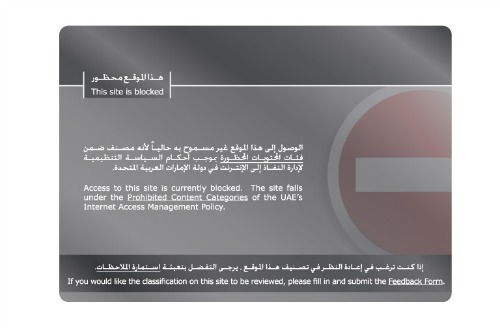 I always swore I would never home-school my children. I know many people do, and do it quite successfully, but I’m awfully fond of the quiet that descends on my house after they’ve tromped off to school. If that tromping were only happening from the bedroom to, say, the kitchen table, I think I might simply lock myself in the bathroom and never come out.
I always swore I would never home-school my children. I know many people do, and do it quite successfully, but I’m awfully fond of the quiet that descends on my house after they’ve tromped off to school. If that tromping were only happening from the bedroom to, say, the kitchen table, I think I might simply lock myself in the bathroom and never come out.
But as so often happens, my vow has collided with reality and I have found myself, in recent weeks, trolling home-schooling websites in search of teaching resources. My kids are now 9 (nine and a half, he would say indignantly) and 13; they go to a British school here in Abu Dhabi. That means they’ve spent a lot of time learning various English kings and queens, although they can’t recite them all in order. They study “maths,” and do prep rather than homework; they study English history and geography; they read mostly English writers in their literature classes. In addition to all those Anglo studies, they take Arabic language classes four days a week and once-weekly class called “Islamic Studies.” The Arabic classes are mandated by ADEC (Abu Dhabi Education Council) and I have to say, I’m much more interested in my kids learning Arabic than I am in their ability to name all the English kings and queens.
Having the boys be in an English system has been a learning curve for all of us. We’re learning two languages, actually, Arabic and, well, English: the boys now live in a world where things are “grey,” luggage goes in the “boot,” and we put garbage in the “bin.”
I’m not considering a dabble in the home-schooling system in order to beef up my boys’ appreciation of the Queen’s English, however. My kids, like every schoolchild in the country, have a curriculum that is at least in part determined by the UAE government, and that means there are things that aren’t supposed to be taught. I live in a place where censorship happens and where, unlike the States, the policies cannot be overtly challenged in the courts. So, for instance, in the States if you live in a town where they want to ban the Harry Potter books, you can take the school district to court. Not here.
We had to sign a permission slip so that our older son could get the science textbook that included the chapter on reproduction (with pictures of, you know, the embarrassing bits); his Latin class translates vinum as … grape, not wine. These are relatively small annoyances, although of course they are far from ideal.
There are, however, more serious concerns in terms of what shouldn’t be included in history courses and literature courses, and that’s where I find myself trolling the home-schooling sites for resources. The Holocaust can’t be taught here; Israel and Judaism are not supposed to be mentioned here; communism isn’t supposed to be discussed; evolution isn’t supposed to be taught; and the list goes on. Sometimes it feels as if we’re living in some kind of Bible-thumping town in the rural U.S and I realize, yet again, that fundamentalism can be seen as a global phenomenon that differs only in the nature of its prohibitions: the fear that motivates the prohibitions stays constant.
Before you leap to any conclusions, please know that the Muslim families I know are as frustrated by these government-issued edicts as are the non-Muslim families and many of us have talked together about what we can do to help our children gain a full picture of the world, regardless of what the government says. So it is that what in some contexts (living in Manhattan, for instance) would be a purely theoretical discussion has become in our household, a very pragmatic series of conversations.
Think about it: how would you talk to your kids about censorship? Is censorship always bad? Think about your children, if you have them, and the internet: are there sites you say they can’t see, or have you put a filter or something on your computer to prevent certain kinds of access? Do we agree that there is such a thing as “good” censorship? (Because of that whole teenage-boy-surfing-the-internet thing, I see a (slight) upside to living in a “nanny state.” I am fairly sure that if he wanted to look, my son wouldn’t be able to find basic porn–not to say that if he really wanted to dig around he couldn’t elude the censors, but at this point, I think his porn-directed vocabulary is still too limited to get around the government blocks. I guess we file that under “thank goodness for small favors,” right? )
My husband and I are both professors, and so we are able to bolster and supplement what isn’t happening in school, but we are also having a lot of conversations with our kids about censorship, politics, and the necessity of thinking about things in ways that are different from how we might think about them. We point out that the UAE isn’t Saudi Arabia; there is no Taliban here; the country is not governed by a theocracy of any sort. We know Jewish families who live here; I know gay couples who live here; a Mormon family lives next door to us. I see people on the beach in the scantiest of scanty bathing suits.
Living here means coming to term with nuance, with ambiguity, with living in a world that is organized around “both/and,” rather than “either/or.” The country is progressive and conservative; censorship is a problem that has a context; learning happens as much from what is not there as it does from what is there. It’s complicated and let’s be honest — no nine year old, no thirteen year old—and very few adults—really likes ambiguity. After all, if there is no “in-between” answer, life becomes much easier, doesn’t it?
No, of course I’m not happy that my kids have a biology textbook with the word “pig” marked out. Of course, I’m also not pleased that the Anglo-centric curriculum also neglects things like the US Civil War, other than in the most general sense. But I will say that I think it is, and will continue to be, a powerful learning experience for my children (and us) to have to confront and think about what it means to live in a place where the government attempts to exert such extensive control. I like to think that, paradoxically, these attempts at censorship will make my children more open-minded adults.
Have you ever been confronted with censorship? How have you dealt with it?
After twenty-plus years in Manhattan, Deborah Quinn and her family moved to Abu Dhabi (in the United Arab Emirates), where she spends a great deal of time driving her sons back and forth to soccer practice. She writes about travel, politics, feminism, education, and the absurdities of living in a place where temperatures regularly go above 110F.
Deborah can also be found on her blog, Mannahattamamma.
More Posts
Follow Me:


by World Moms Blog | Mar 10, 2014 | 2014, Awareness, Bilingual, Communication, Cultural Differences, Culture, Elections, Eye on Culture, Guest Post, Human Rights, Humanity, International, Language, Life Lesson, Living Abroad, Media, Multicultural, Politics, Tragedy, USA, World Events, World Interviews, World Motherhood, World Tour, World Voice
Today, we have a special guest post by a Ukranian mother living in the United States, Olena Centeno, of Bilingual Kids Rock. Olena opens the window and lends us her personal perspective to the current events in Ukraine…
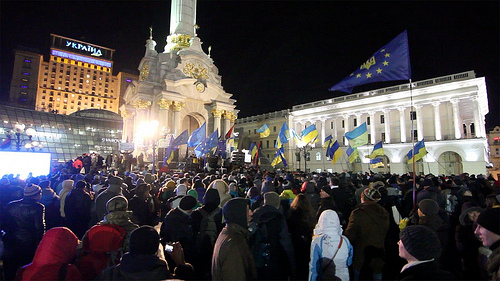
Protest in Kiev, November 2013
What’s it like growing up in Ukraine?
As a Ukrainian, I grew up speaking two languages: Russian and Ukrainian. I ate Ukrainian borsht for lunch and Russian pelmeni for dinner. I love Tchaikovsky’s Sleeping Beauty and Carols of the Bells by Leontovych. I am raising my own children trilingual in English, Russian and Ukrainian. In fact, the two cultures (Russian and Ukranian) are considered so close, that if an Ukrainian abroad says s/he is from Ukraine people often say “Oh, so you are from Russia?”
What’s going on between Russia and Ukraine?
With Russian troops moving across the sea into Ukraine’s Crimean peninsula, a lot of Westerners are starting to ask this question.
The current conflict in Ukraine is more than three months old. It began with a peaceful demonstration on November 21 at Independence Square (Maidan) in Kiev, the capital of Ukraine, when the (now ousted) Ukrainian president (Yanukovich) hesitated to sign an Association Agreement with the EU. This had been one of his major election promises and in breaking it he ignored the desire of millions of Ukrainians.
During the past three months, the “EuroMaidan” demonstration has grown into a much bigger movement. It started as a response to the failed EU deal but then truly turned into a movement against the corrupt government of president Yanukovich, who moved to keep Ukraine in long-lasting and very painful economical ties with Russia.
Then, after the government passed harsh, anti-assembly laws, it became about the basic human right to be able speak and think freely without being punished for it.
More than a hundred lives were lost and thousands injured during violent attempts to remove the demonstrators but people did not leave the cold streets of Kiev. More freedom fighters came from all over Ukraine to support them. Many other Ukrainian cities stood up as well. After three months of struggle, Mr. Yanukovich was impeached and left Ukraine (he refused to sign a resignation; he just ran away). His presidency was considered illegitimate and a new, temporary government was elected.
As Ukrainians were mourning over lives lost and looking into the future with great hope to build their country on principles of trust and freedom, a new enemy emerged: Informational War.
Along with Russia, Eastern Ukraine—where the majority is Russian speaking—is dominated by Russian-language news from the Russian media. Unfortunately, the Russian media coverage of events that have happened over the past three months is falsified [and full of propaganda].
Now, after the armed occupation of Ukrainian territory in Crimea by Russian troops, the reason for their untruthful reporting is understood: Creating social opinion in Russia and Russian-speaking Ukraine justifies military intervention into Ukrainian territories.
Personally, I think Mr. Putin has an imperialistic plan to be the most powerful ruler in modern history—politically and financially—and he will stop at nothing to add Ukraine to his control.
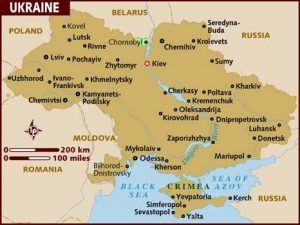
Russian Media Propaganda Uncovered
The following are all lies that have been spread by the Russian media leading up to the invasion of Ukraine by Russian troops:
1. FALSE: Kiev was Overrun by Violent Riots
Despite violent clashes, most of Kiev stayed peaceful throughout the demonstrations. The day-to-day lives of residents were largely unaffected outside of Independence Square and the areas immediately surrounding it. Very little of Kiev or the surrounding countryside was damaged or disturbed by the protests.
I know this because I called my family and friends every day. My nephews were going to school as usual, most of the people attended work on a daily basis, and all shopping malls and grocery stores were working (except for a few in the middle of the protest areas downtown).
2. FALSE: Anti-Russia Fascists Led the Ukrainian Protests
The vast majority of protesters were ordinary citizens tired of a government that they viewed as corrupt and unwilling to listen to the people. There were no fascist elements leading the demonstrations, and there are none leading the new government.
Many of the people I know personally were in Maidan: teachers, IT professionals, doctors, stay-at-home moms, businessmen, university professors, hair stylists and many others. People I worked with and went to school with. And no one will ever convince me that they are fascists. My daughter’s god-father is a surgeon and worked days and nights protecting the health and saving the lives of many.
3. FALSE: The New Government Will Force All Ukrainians to Speak Ukrainian
This is a particularly effective myth for Russian-language media, since it appeals directly to the people who would be most affected. Language has long been a contentious issue in Ukraine. Claims that Russian will be abolished are being used to generate anger against the new government.
The Ukrainian parliament voted to repeal a 2012 law allowing the establishment of minority languages as official state languages in individual provinces on February 23, 2014 but acting President Oleksandr Turchynov vetoed the move. Russian is currently recognized as an official language, is legal for state use in several Ukrainian provinces, and is guaranteed state protection “in all spheres of public life” in Crimea specifically.
I speak Russian and Ukrainian to my children here in the USA. I see language first and foremost as a tool for communication — and shame on any politicians who use it as a reason for war.
4. FALSE: Ukrainian Demonstrators Have Been Attacking Russians or Russian-Speakers
Another unproven and untrue claim widely circulated in Russian-language media is that the Euromaidan protesters were deliberately attacking Russian speakers.
The cruel result is that ordinary Russians – good, wholehearted, educated people – are now eager to help a Ukraine that they think is swamped by fascists! I have family in eastern Ukraine and my god-mother lives in Moscow. They have called multiple times, scared for the lives of my parents in Kiev. They really think Ukraine is in danger.
There is no evidence to support the claim, and nearly all cases of violence during the protest were perpetrated against civilians by security forces. The Euromaidan protests had very little to do with cultural or language issues in general.
While Yanukovych’s perceived obedience to the Russian government was certainly a source of anger in Ukraine, this anger was directed at the President and the actions of the Russian and Ukrainian governments, not to the Russian people or culture.
5. FALSE: The Berkut and Other Security Forces Fought in Self-Defense
Russian news broadcasts have shown extensive footage of the Berkut and other riot police under attack but nearly none of their attacks on civilians. The reality is that security forces attempted to crush peaceful protests with deadly force, and were barely driven back with improvised weapons like clubs and Molotov cocktails. The superior force and aggression were always on the side of the Berkut.
6. FALSE: The Independence Square/Euromaidan Protests Were Organized by Americans
We joke that EuroMaidan is now supported by Americans because my American husband and I made donations to help supply people with warm clothing and blankets during cold winter months.
I am not claiming that on a political level there is no lobbying of interests from outside countries and unions but once again: the politics of the country and the people of the country are two different things.
The vast majority of protesters were native Ukrainians and ordinary residents of Kiev and the surrounding country.
7. FALSE: Fascism Will Spread from Ukraine to Russia
This is another falsehood dependent on the idea that the Euromaidan demonstrators were fascist extremists. It is being used as a justification for Russian invasion. The Russian government claims it is defending Russian-speakers in Ukraine and its own borders from Ukrainian fascists but in reality those fascists do not exist.
What is next?
The military intervention is not over. It is hard to say what is going to happen next. There is a lot of talk going on at a very high, political level involving the EU and the US.
But Ukrainians have already had the biggest win in this struggle: themselves.
They proved to themselves that they care:
- They care about all of our people (amazing examples of collaboration happened during the civil unrest!);
- they care about the future of their country;
- they care about their freedom;
- they care enough to recognize the differences among themselves and to stay united anyway.
The revolution was heartbreaking and tearful but as a result, Ukrainians became true patriotic citizens of their country:
Glory to Ukraine, Glory to Heroes!
слава Україні, слава героїв
(slava Ukrayini, slava heroyiv)
For me, personally, it has been a life lesson in how to raise my own children. I have a clear goal to raise multicultural and multilingual children, who respect other languages and cultures and can see our shared humanity no matter how politicians try to divide us.
This is an original guest post to World Moms Blog by Olena Centeno.
 Olena Centeno is a Ukrainian who lives in USA, a happy mom of three wonderful kids ages 2-9 and a wife to the great. She speaks three languages herself and is raising her kids to be multilingual in English, Russian, Ukrainian and Spanish. She founded Bilingual Kids Rock, where she helps families on their bilingual journey. She also enjoys photography and video making as a way to preserve precious moments of life.
Olena Centeno is a Ukrainian who lives in USA, a happy mom of three wonderful kids ages 2-9 and a wife to the great. She speaks three languages herself and is raising her kids to be multilingual in English, Russian, Ukrainian and Spanish. She founded Bilingual Kids Rock, where she helps families on their bilingual journey. She also enjoys photography and video making as a way to preserve precious moments of life.
You can connect with her at Bilingual Kids Rock.
Photo credit to Oxlaey. This photo has a creative commons attribution license.
World Moms Blog is an award winning website which writes from over 30 countries on the topics of motherhood, culture, human rights and social good. Over 70 international contributors share their stories from around the globe, bonded by the common thread of motherhood and wanting a better world for their children.
World Moms Blog was listed by Forbes Woman as one of the "Best 100 Websites for Women 2012 & 2013" and also called a "must read" by the NY Times Motherlode in 2013. Our Senior Editor in India, Purnima Ramakrishnan, was awarded the BlogHer International Activist Award in 2013.
More Posts

by Sarah Sensamaust | Feb 26, 2014 | 2014, Africa, Cultural Differences, Expat Life, Family, Family Travel, World Motherhood
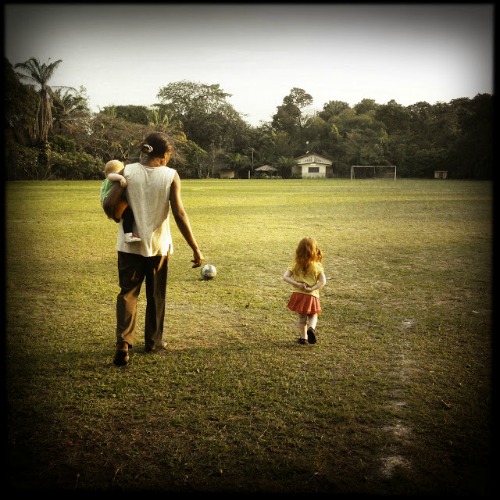 In about three months our lives will drastically change. My husband and I, with our two little girls, will leave the place we’ve called home for the last six years. We will probably never return.
In about three months our lives will drastically change. My husband and I, with our two little girls, will leave the place we’ve called home for the last six years. We will probably never return.
When we first came to Congo, we didn’t know much about the place, we didn’t know a soul here and we definitely didn’t have plans to start a family in this country. My, how everything’s changed.
Just as we had a “feeling” we should move to Congo. Now we have that same “feeling” that it’s time for us to leave. It just feels right and we have wonderful plans on the horizon, but boy is this hard. In fact, we’re feeling a bit lost in our last months here. This is the only home our children have ever known. Our girls have been loved by the nanny or “Mama” who’s helped us raise them for as long as they’ve been loved by us. This will be hard, but it is time.
And so I have lots of questions about how to do this, but more importantly how to do this right. Will there be something meaningful I forget to say or do? Do we make a big deal out of our last goodbyes? Or are our children really too young to understand? There will be tears. There might even be sobs. I hope we don’t needlessly upset them.
I can’t help but think about how much easier our departure would be if we didn’t have children. Their two little lives became a game changer for us living in Congo. Once we had children and the people around us began to care for them and love them, I could feel the roots sprout from my feet and bind us here. They helped us burp our girls when they were babies, nurse them back to health when they were sick, they’ve memorized their every tick and tock. This will be hard, but it is time.
Will our children have any authentic memories from these first years of their lives? Or will their only understanding of Congo come through the stories we tell them over and over? Will the photos they see when they’re older be the only images that remain in their heads? This will be hard, but it is time.
My husband and I always say the hardest part about living abroad is the leaving part. Goodbyes in your host country are usually forever. Sure, it’s hard leaving the United States and saying goodbye to parents and grandparents, but you know they’ll always be a part of your life. You’ll see them again. They’re your home base. They have the internet and email and Facebook and all those other lovely things that keep up connected to those we care about in the States.
When we leave Congo, there will be no email updates. We will not see pictures of the loved ones we leave here. We will miss births and weddings and all the minutiae in between that founded our friendships. This will be hard, but it is still the right time.
Has anyone left the country in which you’ve raised your children, never to return? Was there anything you did to make your last days meaningful or your departure easier?
This is an original post written for World Moms Blog by Sarah. You can find Sarah blogging with Jill Humphrey at Mama Congo.
Photo credit to Jill humphrey.

by Katinka | Feb 17, 2014 | 2014, Adoption, Awareness, Being Thankful, Belgium, Birth Parents, Childhood, Cultural Differences, Ethiopia, Eye on Culture, Family, Friendship, Home, Life Lesson, Motherhood, Multicultural, Parenting, Penguin and Panther, Relationships, Siblings, World Motherhood, Younger Children
 We have a cat. A lot of people have a cat. Ours is named Rino. As in rhinoceros, minus the “h” and the horn.
We have a cat. A lot of people have a cat. Ours is named Rino. As in rhinoceros, minus the “h” and the horn.
Looking back, I got him when he was still a little too small, so he definitely sees me as his cat-mom. He slept in the Big Bedroom during the first months of his life, with me stroking him upon every little yelp. When he wants to cuddle, he tucks his head in my armpit, as if he wants to get nursed. He’s the cuddliest cat I know. And the best frog catcher as well.
Rino is get-out-of-jail-free card. He radiates reassurance. Peace of mind. When I’m overwhelmed by motherhood, he can convince me to allow the children to come back downstairs after their time-out. He reminds me I prefer talking above time-outs.
When the kids are finally asleep, he crashes the couch with me. There’s nothing like the sound and feel of a purring cat to take the daily stress away. Did I mention he’s fat and orange? The perfect blanket. Matches most of my cloths too.
When our son is having a bad morning, he usually refuses to put on his cloths. He goes on strike on the couch, with his head beneath the cushions. We aren’t able to get through to him nor make eye contact. His sister will try, but she always manages to make things worse. Not her fault, and she earns her credits for trying the impossible.
And then Rino comes pawing in. Takes a few bites from his food and then goes straight for his ‘big brother’. The minute I tell my son who is coming for him, we see his face again. Eleven minutes, fifty three strokes and fourteen cuddles later, he will be dressed and heading for breakfast. The same goes for homework, violin practice and heart break: Rino will drag him through.
When our adopted daughter first met Rino, she nearly jumped to the ceiling. She only knew cats as thieves that should be chased from the orphanage’s kitchen, so she hissed and motioned to get him out, hiding behind my skirts. She didn’t develop a liking for stuffed animals either, with a brother sneaking up on her with those. He didn’t particularly like his new little sister those first months and couldn’t stop scaring her away, so we ended up hiding all the stuffed tigers and cats from them both.
Two years later, their bond has grown. They do continue teasing each other. They fight like little demons over who gets to open the curtains in the morning but an hour later in school the little one will call for her brother when she’s running from kissing boys. They always end up wanting to play with the exact same box of Legos that was untouched for weeks before, but just as frequently, they will team up against me, especially when candy is at stake. I was told that is universal proof they’ve developed a sibling bond.
The same goes for Rino. Our daughter considers him part of the family now. She demands we talk about him with first ànd last name, our family name, and she doesn’t believe it’s fair he’s not allowed to go to the zoo with us. He would love the big cats, you know. I’m glad Rino is visibly terrified inside moving vehicles so in the end our daughter’s more or less convinced he wouldn’t really like joining us.
A few weeks ago, my daughter asked how Rino came to our family. Did he come willing? Or was he taken from his mommy? After we hesitantly told her it was the latter, she immediately went to find him and whispered in his ear, “You’re just like me!” Ever since, she considers him her little brother even more.
He has become her mirror, in a way. Whenever she’s fantasizing about what she would like to tell her birth mother, he’s a major part of her story. She would like to send her birth mother pictures and drawings of Rino, but not of herself. Pictures of Rino sleeping in the bird house, of Rino coming from the woods when he hears our car approaching, of Rino sleeping with his paws in the air and head to the side, like a wrongly assembled toy. She wants to tell her all about him.
But most of all, she wants to tell her birth mother that we are such great and loving parents.
For Rino, of course.
Do you have pets that enrich your family? Do they help your children cope with life’s sharp edges? Feel free to share about their funny and serious contributions in your daily life!
This is an original post to World Moms Blog by K10K from The Penguin and The Panther.
The picture in this post is credited to the author.
If you ask her about her daytime job, Katinka will tell you all about the challenge of studying the fate of radioactive substances in the deep subsurface. Her most demanding and rewarding job however is raising four kids together with five other parents, each with their own quirks, wishes and (dis)abilities. As parenting and especially co-parenting involves a lot of letting go, she finds herself singing the theme song to Frozen over and over again, even when the kids are not even there...
More Posts

by Roxanne (USA) | Feb 14, 2014 | 2014, Childhood, Cultural Differences, Divorce, Family, Kids, Motherhood, Older Children, Parenting, Rox is Brilliant, Single Mother, Unintentionally Brilliant, USA, World Motherhood, Younger Children

In a conversation with a friend the other day, she mentioned that someone once asked her if I was seriously okay with letting my 7-year-old go to the bathroom by himself. A little while later I read Mama B’s post about how her house is a dungeon of rules, and I suddenly felt extremely guilty for not imposing more rules on my son. (more…)
Roxanne is a single mother to a 9-year-old superhero (who was born 7 weeks premature), living in the biggest little city and blogging all about her journey at Unintentionally Brilliant. She works as a Program Coordinator for the NevadaTeach program at the University of Nevada, Reno. Roxanne has a B.A. in English from Sierra Nevada College. She has about 5 novels in progress and dreams about completing one before her son goes to high school.
More Posts - Website
Follow Me:



by Jill | Jan 15, 2014 | 2014, Africa, Being Thankful, Cultural Differences, Expat Life, Family, Food, Living Abroad, Motherhood, Poverty, World Motherhood
It used to be so easy.
A $30 box of Rice Krispies was worth writing home about. Sewing pillowcases from pagne fabric was so exciting that I had to Skype my friend in Virginia. Our morning oatmeal topped with cheap passion fruit was worthy of photographic documentation.

I couldn’t stop collecting stories from the new people who suddenly surrounded me. I clearly remember walking to my neighbor’s house one night thinking excitedly, “I am walking…in Africa!” and wondering if I should write a poem.
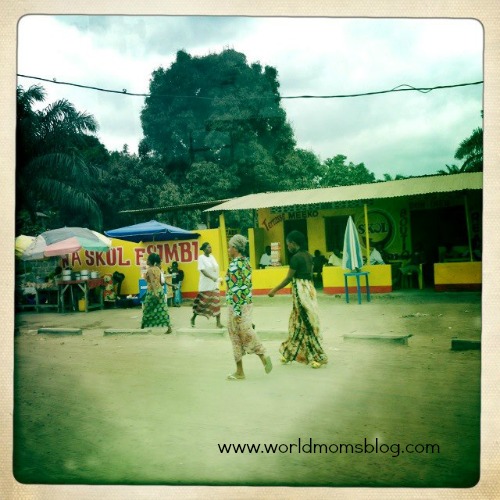
Now, everything about my life seems either too complex to describe, or just not worth it. A few weeks ago I tried to write a fluff piece about the blue tins of Nivea lotion that are ubiquitous around Kinshasa and before I knew it, I was going on about globalization. Other things, I just forget to mention. I don’t notice anymore that it’s weird to pay $40 for laundry detergent, soak your veggies in filtered water and vinegar, stop your car conversation briefly to say “pas aujourd’hui” to a seven-year-old beggar, or pop a live worm out of a person’s skin. These events are ticked off neatly in the daily rhythm of life. I don’t honor them with the thought I once did.
When I sit down to write about my life in Kinshasa, my mind is blank. Sometimes I tell myself that this sudden block is self-preservation. After almost three years, the compounding effects of this city are just too much. In order to function as a nurse and a teacher and a mother and a friend and wife, I can’t stop and ponder every injustice; whether it’s my righteous indignation at the price of the imported fruits I can very well afford to buy, or the story my gardener tells me about the three pregnant teenagers he and his wife feed every day, sometimes giving up their own portion of dinner to do so.
At other moments, I pardon myself by remembering that my lack of enthusiasm is the natural progression of time and familiarity. The honeymoon period with Africa has passed and now I’m just living life. No wonder I don’t hold my pillowcases in rapt reverence anymore. They’re just my red and white pillowcases, getting a little grimy and thin with age. The sellers of trinkets tap at my car windows and I greet those that I know with an open window and a few words and ignore the others. It’s not dramatic, it’s the way to the grocery store.
Then there are the times I berate myself. I’ve become comfortable in my pretty bubble. I let it happen. I cancel French lessons to go to kickboxing class. I allow my housekeeper to buy fruits and veggies for me instead of trekking down the hill to the market and doing it myself. I haven’t learned Lingala. I’ve never seen where the woman who helps me raise my children lives. I’m ridiculous for not being able to write about the Congo. I’m not satisfied with rice and beans and spend hundreds of dollars on imported food that sometimes goes bad before it’s eaten. I don’t listen enough and complain too much. Just another expat.
My parents came to visit Kinshasa just after Christmas – their first time. I felt sad that I couldn’t seem to muster excitement for showing them “our life in Africa.” I couldn’t seem to tap into that newcomer’s elation and share it with them. I hardly took any photos (usually an obsession) and was uninspired by the shots I did snap. My suggestions for food, sights, and experiences were halfhearted. I couldn’t figure out what to do. Even in retrospect, I can’t figure out what I could have done to give them a more authentic experience of my home – which I consider to be wonderful in so many ways. Trying to provide a planned glimpse into my contradictory life proved impossible.
Congo is often described as a country of vicious contradictions: a land bursting at the seams with diamonds, coltan, and fertile dirt yet home to some of the poorest people on earth. NGO workers throw up their hands in frustration and spit nails about failed projects over too many drinks at night. Many of my Congolese friends struggle with the creeping knowledge that they’ve always truly believed it will get better, and it never has. No one I’ve asked has any great ideas. Everyone is just doing the best they can.
I’m not sure what to do with the reality of the Congo I know, so I do the very best I can. Sometimes, that means that I throw myself into the stories of those around me, asking questions I know will lead to heartbreaking tales. Sometimes I read Celebrity Baby Blog instead of Congo Siasa. Sometimes I eat beans and rice. Sometimes I complain loudly about the price of my cereal and buy the box anyway. Sometimes I talk incessantly about the number of mothers and babies who die in this country every day to people who I know are not interested. Sometimes I hear my daughter speaking Lingala and smile proudly.
Sometimes I fret that when I no longer live in Kinshasa, all I will want to do is live in Kinshasa.

What things about your life are too complicated to talk about or even ponder?
This is an original post written for World Moms Blog by Jill Humphrey. You can find Jill blogging with Sarah Sensamaust at Mama Congo.
Photo credits to the author.

 I always swore I would never home-school my children. I know many people do, and do it quite successfully, but I’m awfully fond of the quiet that descends on my house after they’ve tromped off to school. If that tromping were only happening from the bedroom to, say, the kitchen table, I think I might simply lock myself in the bathroom and never come out.
I always swore I would never home-school my children. I know many people do, and do it quite successfully, but I’m awfully fond of the quiet that descends on my house after they’ve tromped off to school. If that tromping were only happening from the bedroom to, say, the kitchen table, I think I might simply lock myself in the bathroom and never come out.


















